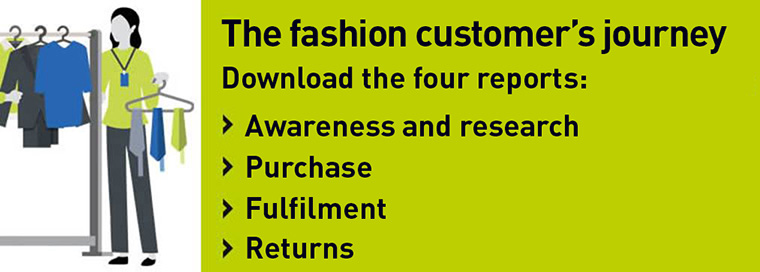

Posted: 13/10/2020
Penningtons Manches Cooper’s latest report in its Fashion Customer’s Journey series reveals rising consumer expectations and the growing importance for retailers to deliver their goods into shoppers’ hands swiftly, seamlessly and sustainably. The impact of Covid-19 is proving to be a catalyst for underlying structural changes within the retail sector and increasing the pressure on retailers to become more agile than ever before to keep and grow their share of the market.
This report on fulfilment, the third stage of the customer journey, uses survey data collected by Retail Economics to explore the three areas where fulfilment is set to transform the retail sector: the need to deliver digital retail in-store; the use of technology and partnerships to expand capability; and the growing call for sustainable fulfilment practices.
During lockdown, more than two fifths (43%) of survey respondents switched to purchasing products online. Although some of this change is temporary, more than a quarter (28%) said that this way of shopping will become permanent. While there are key generational differences, consumers of all ages want to shop as seamlessly as possible and, with fewer shoppers wanting to linger in-store, retail success will increasingly depend on swift and efficient click-and-collect options.
Households shifted quickly to online shopping during the pandemic lockdown putting pressure on retailers’ ability to deliver swiftly. Partnerships such as John Lewis Partnership and the Co-op, and Deliveroo with numerous national food retailers provided the short cut to scale up fulfilment capacity and capability to gain a competitive advantage.
Ultimately, technology is set to play a pivotal role in improving the efficiency and success rate of deliveries, building consumer loyalty, and enabling retailers to scale up and reduce marginal costs.
Both the lockdown and the potential need to socially distance for the foreseeable future resulted in many people prioritising their spending on food and health rather than material possessions. The sustainability of fashion is already a hot topic and there is increasing consumer pressure on retailers to demonstrate an ethos of ‘doing good’ beyond simply ‘selling stuff’.
Commenting on the findings of the report, Matthew Martin, corporate partner and co-head of Penningtons Manches Cooper’s fashion and luxury brands sector, said: “When it comes to fulfilment, the pandemic has served to magnify existing thorny questions and accelerate the structural changes that many fashion retailers had already been grappling with for some time.
“Historically dominated by bricks-and-mortar, traditional apparel brands had been struggling with the adoption of online retail for several years. While there’s no denying that the sector has been one of those worst hit by the crisis, with few businesses escaping the impact of lockdown and attendant economic downturn, what is clear is the way in which getting goods into their customers’ hands has become – and will remain – more relevant and complex than ever.
“Alongside this, customer expectations are continually being raised by those retailers who have invested heavily in technology and systems to ensure smooth fulfilment and enhance the overall buying experience. A seismic shift is taking place and there’s no doubt that further waves of disruption will continue to shape both the physical and digital retail landscapes for some time to come.
“Exactly how this will evolve over the next few years is a point of debate but credit is due to those retailers who have already taken bold steps towards the ‘new tomorrow’.”

Email Matthew
+44 (0)20 7753 7521

Email Gavin
+44 (0)1865 813623
